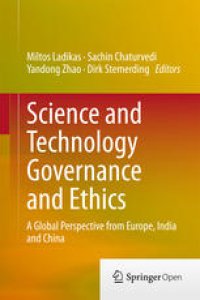
Ebook: Science and Technology Governance and Ethics: A Global Perspective from Europe, India and China
- Genre: Business // Management
- Tags: R & D/Technology Policy, Ethics, Food Science, Nanotechnology, Biotechnology
- Year: 2015
- Publisher: Springer International Publishing
- Edition: 1
- Language: English
- pdf
This book analyzes the possibilities for effective global governance of science in Europe, India and China. Authors from the three regions join forces to explore how ethical concerns over new technologies can be incorporated into global science and technology policies. The first chapter introduces the topic, offering a global perspective on embedding ethics in science and technology policy. Chapter Two compares the institutionalization of ethical debates in science, technology and innovation policy in three important regions: Europe, India and China. The third chapter explores public perceptions of science and technology in these same three regions. Chapter Four discusses public engagement in the governance of science and technology, and Chapter Five reviews science and technology governance and European values. The sixth chapter describes and analyzes values demonstrated in the constitution of the People’s Republic of China. Chapter Seven describes emerging evidence from India on the uses of science and technology for socio-economic development, and the quest for inclusive growth. In Chapter Eight, the authors propose a comparative framework for studying global ethics in science and technology. The following three chapters offer case studies and analysis of three emerging industries in India, China and Europe: new food technologies, nanotechnology and synthetic biology. Chapter 12 gathers all these threads for a comprehensive discussion on incorporating ethics into science and technology policy. The analysis is undertaken against the backdrop of different value systems and varying levels of public perception of risks and benefits. The book introduces a common analytical framework for the comparative discussion of ethics at the international level. The authors offer policy recommendations for effective collaboration among the three regions, to promote responsible governance in science and technology and a common analytical perspective in ethics.
This book analyzes the possibilities for effective global governance of science in Europe, India and China. Authors from the three regions join forces to explore how ethical concerns over new technologies can be incorporated into global science and technology policies. The first chapter introduces the topic, offering a global perspective on embedding ethics in science and technology policy. Chapter Two compares the institutionalization of ethical debates in science, technology and innovation policy in three important regions: Europe, India and China. The third chapter explores public perceptions of science and technology in these same three regions. Chapter Four discusses public engagement in the governance of science and technology, and Chapter Five reviews science and technology governance and European values. The sixth chapter describes and analyzes values demonstrated in the constitution of the People’s Republic of China. Chapter Seven describes emerging evidence from India on the uses of science and technology for socio-economic development, and the quest for inclusive growth. In Chapter Eight, the authors propose a comparative framework for studying global ethics in science and technology. The following three chapters offer case studies and analysis of three emerging industries in India, China and Europe: new food technologies, nanotechnology and synthetic biology. Chapter 12 gathers all these threads for a comprehensive discussion on incorporating ethics into science and technology policy. The analysis is undertaken against the backdrop of different value systems and varying levels of public perception of risks and benefits. The book introduces a common analytical framework for the comparative discussion of ethics at the international level. The authors offer policy recommendations for effective collaboration among the three regions, to promote responsible governance in science and technology and a common analytical perspective in ethics.